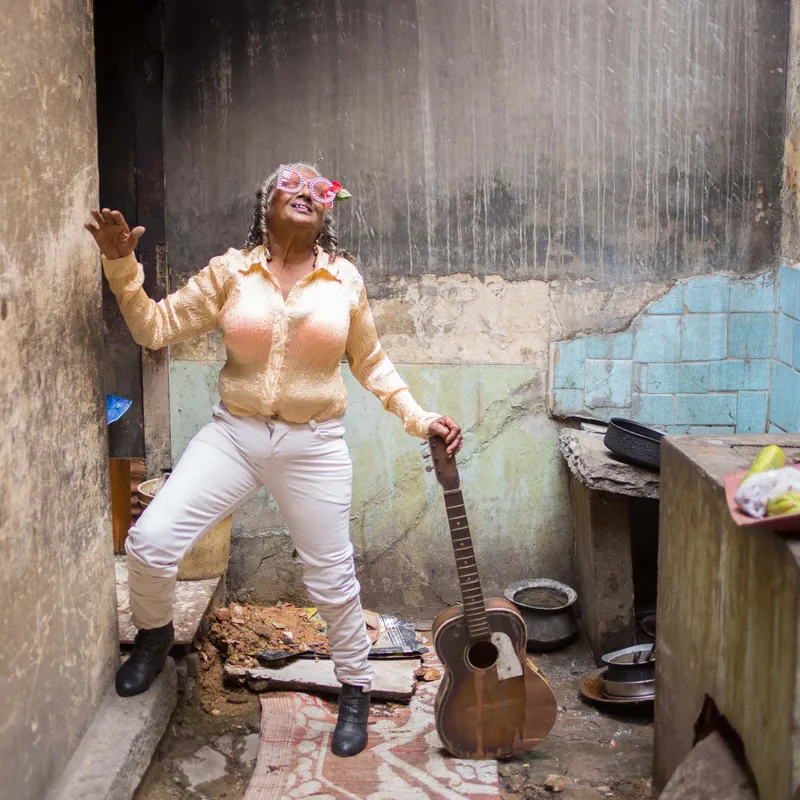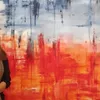Cecilia owns the streets: talking feminist geography with artist Indu Antony
Photographer Indu Antony has initiated a community art project expanding the conversation around women’s safety in public spaces.
Have you wondered why a woman needs to be all dressed up and go to a fancy bar if she desires to drink, while a man can hop on to any neighbourhood haunt? Have you wondered why a hardware shop has to be right next to a men’s barber’s shop, next to a shady bar, next to a shadier auto parts junk store? Have you wondered why a woman can’t walk alone in city parks?
If you look around, you will see much of urban planning is designed, by men, for men. Male gaze or patriarchy is endemic to urban planning and development, so much so that women are either invisibilized or subject to violence in public spaces.

Cecilia by Indu Antony
This is something that feminist geography — the application of feminist methodology to geography studies — aims to address in its nuanced interrogation of gendered spaces. This shaped Bengaluru-based artist Indu Antony’s brainchild, a community art project ‘Cecilia’ed’.
The face of the project — that received the Public Art Grant from the Foundation for Indian Contemporary Act (FICA) — is 76-year-old Cecilia. In what makes it a shared sisterhood of violent memories, like every other girl growing up or woman living in India, Indu too was subject to harassment on the streets, being spat on her face and held at knifepoint.
Five years ago, when Indu met Cecilia on her way to church, a single woman who lives by herself in Bengaluru’s Malleswaram, it was as if she met her kindred spirit in the latter’s irreverent self.
Both live on their own and have had their share of abuse in a public space. “It is as if I met the future me,” recalls Indu. The duo developed a camaraderie, and Cecilia, in her beautiful irreverence, would pronounce Indu to be an “ugly dresser”.
Indu was driven by the purpose of igniting a long-term conversation around the subject of women’s safety in public spaces in a city that has earned lousy press for being one of India’s top unsafe metros for women.
Continuing to meet Cecilia and bonding over brandy, Indu says, “I selected her for her personality.”
Cecilia’s empowering personality and her keen sense of fashion put together through clothes that she would intuitively wear in an eclectic medley became the muse of her project.
The project features Cecilia in more than 100 photographs, all shot by Indu in Cecilia’s house. They show Cecilia flaunting her eclectic, age-defying, convention-defying, self-styled sartorial bursts.
The Instagram page ‘Cecilia’ed’ has photographs bearing the visual signature of both model and muse.
“All the photographs are set in the house to ensure uniformity in background. This allowed the model to be in her element, which in turn, became the signature for the series. If the background had changed, it would have taken the attention away from the person, but it is about Cecilia and her spirited personality,” says Indu.
Indu’s research, outreach programme, deep knowledge in feminist geography and creative interventions are committed to expanding the conversation around women’s safety.
“Who defines public spaces — the male-dominated areas — and how can women access these spaces? For example, JC Road (Bengaluru) is considered to be a ‘male’ area, while there are hardly any female-friendly public spaces in the city,” she asks.
Disrupting normative notions of gender in public spaces by “reopening” neighbourhood public spaces marked ‘unsafe’ for women in Bengaluru, the first phase of the Cecilia’ed project looked at the research and a backstory as part of its methodology — stories of women like Indu and Cecilia and women at the neighbourhood Anganwadi where Indu worked at in a developmental role.
The research also expanded to real-life stories from the local police station and those collected through research and newspaper cuttings.
The second phase is outreach leveraged through social media, the project website, and meetings held at Anganwadi centres and messaging disseminated via local WhatsApp groups, pamphlets delivered with newspapers and bulletins aired on local television driving the message to targeted community places like the local barber’s shop.
Modelling it in the spirit of community building, Indu and the team visited local yoga centres to spread the message. Resources from the florist to the printer were roped in as co-partners of the project.
Gender disruptor and a celebrity diva
Channelling interventions in “celebrity culture” and leveraging the power of “herd mentality” as the third leg of the project, Cecelia went on to flourish as the Shah Rukh Khan of the project.
As Indu says, Cecilia is a superhero — ‘The Gender Disruptor’. Her Gender Disruptor avatar has also been featured in small comic strips in a series of memes.
The project has received support from Bengaluru-based poet Mimi Chandra, who also wrote a poem for Cecilia’ed. The Vijaynagar metro station in Bengaluru has a permanent mural of the project as it addresses a key concern of city administration - women’s safety in public transport.
Reopening streets, resisting patriarchy
Indu also found a collaborator in Google Maps as every such street that has reopened, reclaimed and made accessible to women is now marked ‘safe’ on the global real-time navigation site.
“The idea of reopening was to identify areas that were prone to attack, based on incidents of abuse reported from these and also spaces where women felt unsafe, and to subvert the latent threat of violence by reopening those places for women. At every act of reopening presided over by multiple speakers and Cecilia, we decorated the space with lights and shamianas, lit a lamp, cut a cake, basically followed all rituals associated with unveiling a space. We also had a helpline inviting women to break the silence about what happened to them,” informs Indu. They had an ‘Open Bar Night’ where members would walk inside a shady bar and reclaim it as their space disrupting gender bias.
At one such reopening session, an older woman walked up to Indu, asking her to support her daughter, who, after facing abuse on the streets, had locked herself up, fearing outside spaces. Change might be a slow process, but the conversation has begun, she remarks.








